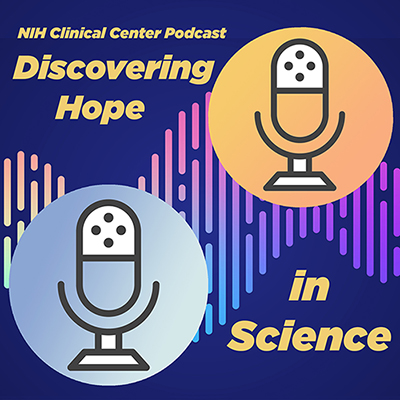[Background Music]
NARRATOR: From the National Institutes of Health Clinical Center, this is Discovering Hope in Science.
[Background Music]
SEAN MARKEY: I'm your host, Sean Markey. In today's episode, we speak with Dr. Ann Berger, chief of Pain and Palliative Care at the Clinical Center. A clinician and researcher, Dr. Berger works to ease the suffering of people facing serious illness. Her research has explored the fundamental question, what is healing? She has also developed a tool to measure the effect of nature, mindfulness, spiritual faith, even psychoactive drugs on reducing suffering and facilitating recovery. Dr. Berger, welcome to the program.
DR. ANN BERGER: Thanks for having me.
MARKEY: Fifteen years ago, you set out to answer the question, what is healing? What inspired that scientific journey and what did you discover?
BERGER: What I found as both a oncology advanced practice nurse and then a physician, is that people with life-threatening illness, particularly a life-threatening illness, that they confront mortality issues. Sometimes they grow from the experience. And by grow … people will use the words, I feel healed from this. Or they will use the words that, this illness has been a blessing. Does that happen overnight? No, but it happens over time after one has the diagnosis and starts getting treatment for it and starts dealing with the life-threatening diagnosis. I myself, besides being a nurse and a physician, have had life-threatening illness at least two to three times, including cancer and cardiac illnesses. And the same is true of family members, including my children and husband. And so I've seen this healing take place. And so to me, I wanted to better understand what healing is and how it can be measured. So that we can then see who is healing, why some people are not healing, and what interventions can be useful to help people heal.
MARKEY: How do you understand healing?
BERGER: It's becoming whole. It's feeling more connected. It's becoming whole. It's essentially feeling like this life-transforming event was a blessing. In some ways, people tend to find more meaning and purpose in their life if they end up having a healing experience. They find more meaning and purpose in their life, and you see a lot of connections being formed that weren't there before. So that there are a lot of connections made with family members. Lots of things like forgiveness happens and relationships and stronger bonds develop that weren't there before. People are able to be more present in the moment. It's actually something I see that as a blessing, because it's something that it forces you to look at life in a different way and appreciate life in a different way so that you are more intentional about how you live your life.
MARKEY: You created a tool, a survey, called The Healing Experience of All Life Stressors, or NIH HEALS. Tell us about it.
BERGER: What I found in developing a tool was that it was not an easy process. This was at least a decade, decade and a half. Rather than just come up with a bunch of questions, which is how some tools are developed, we really need to ask people who are experiencing it. So we went to individuals who had experienced life-threatening illness with cancer in several different places, including here, and a organization called Hope Cancer Center. And then we also looked at patients with cardiac illness, both at NIH and at Suburban Hospital. We did interviews. We asked them what kind of healing experiences you had, but we did not use the word healing. What we did was we used the word, did you have a positive life transforming event? You start seeing that the data is very similar from person to person. It was very clear that a lot of it had to do with relationships, with people, with nature, with arts, and for some people with a higher power for others not.
BERGER: So connections were important. It was very clear that things like compassion, trust, and acceptance, meaning and purpose in your life, those things were themes that kept coming up and seems like being in the moment, being more present, which actually has a lot to do with being more mindful. And so those are the themes that kept coming up over and over again. We were able to come up with a bunch of questions and what we call three factors. So there are three parts of the questionnaire, and so we labeled those again, connection, which has to do with connection with a higher power and or family people reflection, introspection, so things having to do with compassion, with mindfulness, with being in the moment and then trust and acceptance, having to do with meaning, purpose, and essentially accepting things that can't be changed, and we then had a tool.
MARKEY: What do you hope listeners take away from your research?
BERGER: Well, that healing is possible with life-threatening illness, and I mean potentially, we'll be able to test that healing as possible, even not with life-threatening illness, but with those who become more mindful and be dealing with other losses and trauma because I think losses in trauma is something that we all experience in life.
MARKEY: Thank you for listening to "Discovering Hope in Science." Stay tuned for our next podcast. View more episodes.
![]() Sign up to receive email updates for NIH Clinical Center Podcast
Sign up to receive email updates for NIH Clinical Center Podcast



